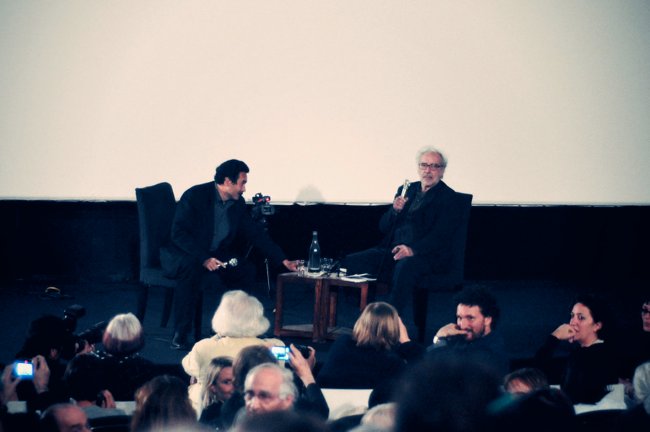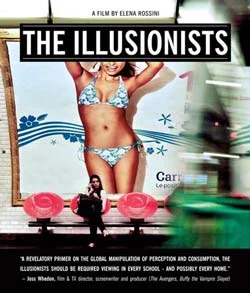
If you’ve missed part 1 of my account, catch up here.
Following the screening of his latest opus Film Socialisme, Jean-Luc Godard opens and ends a two-hour long discussion with the public making personal – and quite incendiary – statements.
When the moderator announces that a microphone will be circulating around the auditorium, Godard stops him in mid-sentence and goes, “I’d like to say something first, before we begin.”
What follows is almost a manifesto that rejects the status of current cinema. Or popular culture, if you will. Godard wants to make it crystal clear that he feels removed from the current state of affairs – he sees a difference in between “Cinema” (with a capital “C”) and mere “films.” When he started out in the late 1950s/early 1960s, he – and his fellow filmmaker friends – only had 50 years of cinema behind them. On the other hand, the current crop of young and aspiring directors have twice as much as that: more than a hundred years of cinema and masterpieces. “From Murnau to Avatar” Godard says. He stresses several times that today there is no distinction in between “Cinema” and “films.” The same goes for literature: a best selling novel by Marc Levy isn’t necessarily great Literature. A painting by X or Y isn’t necessarily “Art.” A rapper doesn’t necessarily make “Music.” It doesn’t mean he’s less talented. He may aspire to it. But “Music” is other stuff. “Cinema” today has disappeared. What people call “cinema” are (mass market) films.

Here’s a visual example for you, Godard says. He carefully plucks from the small wooden table in front of him a folded piece of paper, which he had been nervously playing with since he took the stage. With the aid of the moderator, he unfolds it before the audience’s eyes. It’s a two page spread from the esteemed French newspaper Le Monde. A black and white advertisement by a luxury brand – the close-up photo of a young man who’s staring seductively at the camera – takes up 60% of the space. The actual article from the newspaper runs on two columns, one on the left, the other on the right of the gigantic picture. The great provocateur, with a Cheshire Cat grin on his face, says to the audience, “I’ll show you a little example of what is cinema today.”
“Readers, they read the text, they jump over the image, but they don’t think that the image is part of the spread.” Pointing to the left column of text Godard says “This is a film.” Pointing to the right column: “this is also a film.” The cinema would be the whole thing, the two page spread and the photo. Some people in the auditorium are quizzically looking at each other and scratching their heads. “L’Homme” (the man) – that’s the slogan of the ad. Godard continues: “‘L’Homme’ – it made me think of Stalin’s sentence: ‘Man is the most precious capital.” Pointing to Le Monde, “Here’s an image and here is a text by Stalin. Stalin is called Dior today.” Thunderous laughter and applause ensue.
Godard takes questions for the next two hours. The tone of his answers has already been set by his film and by his initial statement: I am under the impression that Godard feels above us all, disgusted by the current state of cultural and political affairs, and nostalgic of an earlier time.
An audience member, a man in his early 20s, takes the microphone and, in true French fashion, starts rambling on for five minutes, saying that he found the film somewhat hermetic and elitist – but “it is sometimes the job of the artist to do that.” And then he asks Godard, “Did you want to capture on film moral regression?”
Stung by the accusation of “elitism,” Godard snaps back: “If you look at a painting by Rembrandt, you don’t think it’s elitist. But he worked for the kings. Moliere worked for Louis XIV. Did they think of themselves as elitist? I was trying to affirm a point of view. You see the sea. What’s hermetic about the sea? Why do you look at the sea and think, ‘I don’t understand?’ Who’s the elitist here? I think it’s actually you, more than me.” Broad smiles around the auditorium.
Later, another questions bothers JLG. A 30-something man with long, curly hair asks him about a scene that appeared in the film. During a cruise, we see people merrily dancing, while philosopher Alain Badiou (who plays himself), is in the cruise liner’s auditorium, giving a lecture in an empty room. The audience member asks, “What’s the meaning of that?”
Godard, feeling skittish, cuts him off in mid-sentence: “Eh alors? So? What’s terrible is: if I had filmed a dog or a cow alone in a field, would you have asked, ‘Why is the cow all by herself in the field?’ I’m not speaking of Badiou. I should have said a wolf or a tiger in his case. But why do you interpret everything?” People laugh in reaction to his comment.
The great master has nothing to say when an older gentleman takes the microphone and announces before the entire auditorium that he was a classmate of Godard’s: they went to high school together. While this man lavishes Godard with touching compliments, Godard himself shuffles in his chair, takes a couple of drags from his cigar and starts rummaging through his pockets looking for something. During the entire speech of this older gentleman Godard doesn’t acknowledge him nor does he make eye contact. Not even once.
At the end of the discussion, after the moderator has announced that the evening has concluded, Godard takes the microphone again and makes one final statement. He talks about a scene that he wanted to put in Film Socialisme, but eventually left out. He wanted the little boy to say, “Why do ‘equality’ and ‘shit’ rhyme?” But this would have gone too far, he thought. Too bad. Godard goes on to explain, “Whether you are Nicolas Sarkozy or Madame Bettencourt, rich or poor, there is one unique moment in people’s lives that serves as a great equalizer. It’s not when we talk or hear or eat or love. It’s when we have a bowel movement. It’s the moment when we are all sitting on a throne. Equality is right then and there. And we find something that is tragedy and democracy. Real equality. But if that’s the only place where it happens, it’s quite tragic.”
After exiting from the auditorium, Pippa and I are faced with two choices: follow the trail of people on the way out of the cinema, or sneak into the cinema’s bar, where the two illustrious guests may be hanging out. We go for the latter option. And sure enough, as soon as we make it past the swinging doors, we see the New Wave’s mom and dad talking to each other, not even two feet away from us.
My friend Pippa eventually builds up the courage to go up to Godard and speak to him. I tell her that, given his previous shenanigans, I would be traumatized for life if he ever said anything rude or dismissive to me. He is, after all, the living director I admire the most. So Pippa heads in his direction while I and my palpitations go to the bar and fetch a glass of water. By the time I’m back in the spot where I left Pippa, I see her leaving Godard and coming towards me, trembling just a tiny bit. Godard is looking in our direction. We make eye contact and he flashes me a huge smile. I’m in a state of Nirvana. Pippa tells me about their exchange: she asked him what he thought of the Internet and if he was at all interested in multimedia projects or web films. His answer: “I’m a painter. I don’t even have an internet connection at home.”








Excellent blog entry! I have linked it to my Godard site: http://cinemagodardcinema.wordpress.com/interviews/
Thank you! :)
I don’t have internet at home…shows how reclusive he has become he still wants to live in his little wonderland where he is something great…whilst the public has come to the opposite conclusion…sexist, perverted over-rated hypocrite, Truffaut stopped talking to Godard decades ago.